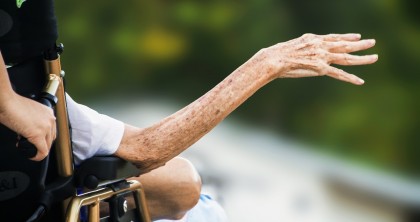The Autonomy Argument
Kate Whittaker Cousino | Apr 25, 2017
In my last post, I observed that, "The bodily autonomy argument is a powerful one because it does feel obvious and intuitive. It's why rape is such a violation—because it uses the body against the individual's will, introducing a wound between will and body, self and self."
Although the idea of a "right" to bodily autonomy is most compelling applied to imposed violations like rape or torture, it seems to be most often invoked in defence of abortion.
Which raises the question: Is an unborn child an aggressor, and can bodily autonomy be retained or reclaimed at the expense of those who are weaker?
Or perhaps the question is whether bodily autonomy is achievable at all?
Are any of us fully autonomous? Set aside the "physical" aspect for a moment. Do any of us rely only on our own efforts for food, shelter, clothing, health care, etc? Buying these things is not a fully independent and autonomous act, since it is dependent on the social contracts that cause money to be honoured and contracts to be enforced. We are not economically or socially autonomous.
 If I cease to be autonomous, do those I become dependent on thus acquire the right to exploit or neglect me to reduce the burden of care for me? How does this argument not justify elder abuse?
If I cease to be autonomous, do those I become dependent on thus acquire the right to exploit or neglect me to reduce the burden of care for me? How does this argument not justify elder abuse?
This is where someone tells me that I'm obfuscating by mixing other forms of independence with the idea of bodily self-governance. The body, I will be told, is more integral than anything in these other examples, and while culture, law, self-interest, and morality can compel us to interdependence with others on financial and social levels, none of these justify compelling us to bodily interdependence. By this argument, bodily dependence on another justifies violence or neglect from them to a degree other kinds of dependence do not.
But there's still a presumption here that true bodily autonomy is both achievable and defensible, and I'm not convinced. Autonomous means "self-governing." I'm not sure this is an adjective that applies fully to the human body as we find it here, in this world.
As I wrote elsewhere five years ago:
Do impotent men or infertile women govern their bodies? Does a teenage boy ‘govern’ the body that embarrasses him with spontaneous displays of arousal, or a menopausal woman ‘govern’ the body that wakes her in the night steaming and sweating?
Does an unborn child have a right to bodily autonomy that is violated by his mother’s ability to affect his nutrition, his environment, the sounds he hears? Is the newborn violated by her lack of choice of family, culture, home, education?
Are you violating the people around you when you shed your germs in their environment, assault their eyes with your clothing choices, release your scent into the air they breathe?
We are autonomous in will. No one else can will for us, though they can certainly limit our options by the choices they make – which is all the more evidence that we are communal creatures, as our choices limit their options as well. Our autonomy of will is a right in the ‘inalienable’ sense of the word – nothing done to us or by us can possibly separate us from our free will, or from our responsibility for the decisions we make.
And here's where I get to the crux of the matter.
To be continued....
[Image credit https://pixabay.com/en/hospice-wrinkled-hand-elderly-old-1794351/]
